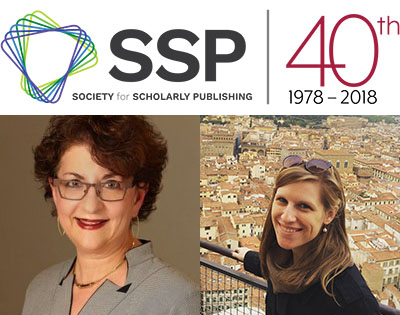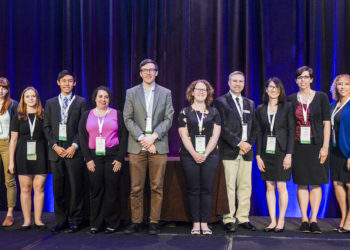To celebrate the Society for Scholarly Publishing’s (SSP’s) 40th anniversary, I invited two members — at very different stages of their careers — to engage in a conversation about why and how they got involved with the Society; what they find most valuable about being a member; and to share their hopes for SSP in future. Sue Kesner, Senior Director, Rightsholder Relations at Copyright Clearance Center, and Emma Brink, Health Science Journals Editor at Wiley, were meeting each other for the first time. I hope you enjoy reading their conversation as much as I enjoyed listening to it!

Emma: Sue, how did you get involved with SSP?
Sue: I started my career as a librarian and, while working in a public library, I answered an advertisement looking for librarians. The company was called SilverPlatter, an early entrant into the Abstracting & Indexing world. I was there for 10 years, including two years on a startup venture. SilverPlatter doesn’t exist any more but I found it a wonderful, creative atmosphere to learn business and to work with some of the brightest people in the field. I left in 2000 and in 2001, SilverPlatter was acquired by Wolters Kluwer and merged with their Ovid platform. SilverPlatter has basically disappeared.
From there I moved to Rowecom, and then on to Infotrieve. Until then I had always been in library-facing roles, but at Infotrieve I became the Director of Publisher Relations, and my manager, Jan Peterson, urged me to join SSP to help me find a place for myself among publishers — to get known, be active, network. The first committee I joined was Membership, which at that time was focused primarily on organizational memberships. Subsequently, I joined the Annual Meeting Program Committee, which I co-chaired twice. In 2004, I left Infotrieve to join Copyright Clearance Center. CCC encouraged my involvement with SSP and to my surprise, in 2007, I was asked to run for SSP President. I served from 2007-2008. During my tenure we launched a strategic plan which, among other things, called for the founding of an SSP blog. One of the most exciting moments of my term was a meeting in Kent Anderson’s office (then) at the New England Journal of Medicine. I reminded him that the blog was part of our strategic plan and, to my surprise and delight, he said: “I’ve been thinking about that as well — I’ll do it!”
After I was President, I continued to be active in SSP, starting the first iteration of the Professional Development Committee (now the Career Development Committee) and serving on the Organizational Alliances Committee. As my work and travel commitments were becoming more difficult to manage, I took a break for a few years. But when Ann Michael, then President, asked if I would consider chairing the Kitchen Cabinet (the SSP Committee responsible for The Scholarly Kitchen), I jumped at the opportunity.
What about you, Emma?
Emma: I graduated from college in 2012 and wanted to work in publishing. Like many people, I wasn’t aware of scholarly publishing and fell into it by being in Boston, where our industry is prevalent. Before that I hadn’t really been aware of it as an option. I started as intern at Wiley and still work on same team – society journals in Health Sciences. I’ve progressed from being an editorial assistant, to a coordinator, to now being a full editor/journal manager. I got involved with SSP in 2014, when a colleague encouraged me to apply for a travel fellowship. My application was successful and I signed up for committee work at the Get Involved lunch. By coincidence, I’m now involved in the Career Development committee – I co-chair the Early Career Sub-Committee.
So why did you join SSP, Sue, and why have you stayed involved?
Sue: Networking, both for myself and for my organization. And I have stayed involved because SSP feels like home to me. Why does it feel so different than other organizations? Maybe because it’s an organization of individuals? A place you can join on your own even if your company chooses not to affiliate. It has always felt open and welcoming. At present I’m doing a lot of active mentoring through SSP and other industry organizations — as well as staying involved with The Scholarly Kitchen. There’s something really special about having been there at the founding of the Kitchen and being involved again now 10 years later.
Emma: Are there other new things you find valuable?
Sue: SSP has evolved…most notably since (Executive Director) Melanie Dolechek’s arrival. There is more structure, a clear vision for the future and Committees and Task Forces in support of that vision. SSP relies on volunteers for so much and the current infrastructure supports those volunteers more than was possible 10 years ago.
Emma: What do you think SSP should do to stay relevant in future?
Sue: All publishing organizations need to listen to people like you — the next generation, the millennials. I learn so much from my mentees — about the challenges they face in their careers, their jobs, the changing landscape. If we lose sight of your needs we will fail, though I don’t see that happening. There’s so much interest in continuing to engage with early career folks — for example, through travel grant and mentoring programs. Being inclusive is important. Having served on the Nominating Committee I’ve seen how important it is to canvas people from right across the community — librarians, vendors, students. It’s part of SSP’s DNA now but wasn’t always.
Emma: I agree, it’s always felt very diverse to me in terms of types of organizations represented. Moving on, what has been the biggest disruptor you’ve observed in scholarly publishing – and how (if at all) did SSP respond?
Sue: There was a recent “Ask the Chefs” post on this! We have addressed a lot of those disruptors through our programming over the years. For example, Amy Brand, now Director of the MIT Press, brought in the founder of eInk as keynote speaker well before the Kindle was launched. We heard it first at SSP!
In 2006 or so, I had dinner with a group of senior publishers on the first night of the SSP annual meeting. One of them commented that he was surprised that there was only one session on Open Access on the program when “that’s all that publishers are interested in.” Another replied: “But over 600 people are here from across so many organizations that SSP must be doing something right. No other publishing organization attracts such a large audience!” And he was right — we do get out in front of a lot of trends rather than just focus on current day issues.
Emma: I agree. I often hear about things via SSP a year before they’re being discussed anywhere else. Going to the annual meeting is very valuable for that reason!
Sue: The Scholarly Kitchen Chefs are also often way ahead of others in their thinking — and they’re not afraid to tackle some of the difficult subjects.
Emma: I also agree that SSP is a very comforting organization to be part of.
Sue: Yes, but there’s always more we can do in terms of making people feel welcome, for example, the travel grant winners who have traveled a long way.
Emma: So what have you found especially valuable and why would you encourage people to get involved?
Sue: The Annual Meeting Committee is especially valuable. It’s typically a large committee that meets often, so you get to know many people and you also get to hear firsthand what is top of the mind for so many companies. The Membership Committee is also an interesting spot in that you actually articulate the value of being a member. And with all committees, the camaraderie on the monthly phone calls is great — and of course you get to meet and work with people you wouldn’t normally come into contact with.
Emma: If you could give the SSP President one piece of advice what would it be?
Sue: Listen to your early career members, that’s really really important. Also, be sure to keep the “specialness”. I do worry a bit that the Annual Meeting may have grown too big — it’s wonderful for SSP financially but we do run the risk of losing the personal side that makes SSP such a special place. So we must find ways to keep the intimacy. Regional events can help. And we must also keep SSP forward-looking by engaging with a diverse range of people — from different backgrounds, ages, career stages, and so on. There’s so much to be gained by listening to all kinds of people.
How does SSP help you, Emma?
Emma: When I first started volunteering, the value I found was the opportunity for leadership. I was in a junior role so I needed to look outside my company for those sorts of opportunities. Networking, of course, is also a huge benefit. And as we said earlier, it’s a great way of keeping up with – or ahead of! – trends.
Sue: It’s interesting that you mention the leadership opportunities, as I felt the same way, especially when I stood for President. Do you think that taking a leadership role in SSP has helped your career?
Emma: Yes, I do. I think makes me stand out. I won the Emerging Leader Award last year with a colleague, and that really helped raise my profile at work. But more importantly it’s been about the great people I’ve met, some of whom are good friends now. That’s really why I keep going.
Sue: Yes! So what does SSP need to do to stay relevant in future from your perspective?
Emma: I agree with you that meeting the needs of early career professionals is really key. Helping us feel more confident in our careers, making us feel welcome. For example, I feel very much part of SSP but I’ve never commented on The Scholarly Kitchen.
Sue: Why not?
Emma: I think I’m a bit scared to. I read the comments and enjoy them but don’t feel confident about commenting publicly myself. I hope the Early Career Sub-Committee can help early career professionals grow in confidence about making our voices heard. I gather there’s going to be a new series on the Kitchen specifically aimed at ECPs, and maybe summary versions of some of the more complex posts would help, too.
Sue: Have you been to any other industry meetings?
Emma: Not really. I attended the PSP boot camp and I’m going to ISMTE for first time this year. What I really like about SSP is that, unlike the training I get from my own company, I get to hear a much broader range of perspectives from different organizations. I feel like I’m getting such a great education from SSP.
Sue: So what would you tell the president to focus on?
Emma: Diversity is really important. Our industry is lacking a lot of perspectives at present. There’s a lot of representation in SSP in terms of different types of organizations and career types, but it’s missing other types of diversity — socioeconomic, for example, which is very important. I’d love to see Board members elected who reflect this diversity – even including younger people (who are also more likely to be diverse). The Early Career Sub-Committee is working on outreach to universities to attract more diverse people into the industry from the get-go. I’d encourage the board to come up with other ways to support increasing inclusion.
Alice: Thank you both so much!
Discussion
3 Thoughts on "Celebrating SSP at 40: A Conversation between Emma Brink and Sue Kesner"
Just a personal comment: I only realized in reading this interview that Sue was president of SSP in the very same year I was president of the AAUP (now AUP). Since by then Sue was working for the CCC on whose board of directors I served (from 1992 to 2017), and we had already had contact before when she was working for Infotrieve, I’m surprised I didn’t know we were both presidents simultaneously. Of course, it’s also possible that I knew and simply forgot!
Sandy, I remember our many connections but not that we were presidents of SSP and AUP the same year. Thank you for pointing that out.
Sue is so right about the need to maintain (or regain?) a sense of connection within SSP. I can only imagine what it must be like to be a first time attendee now.
One of the things SSP is working on to address this challenge is a Peer Networks program, where small groups of people can work together in groups over time Crsation: diversity, and early career issues.



